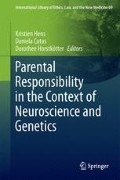Abstract
This chapter discusses the responsibilities of family caregivers in the evolving process of genetic biotechnology in Yoruba-African culture. Using sickle cell anaemia (SCA) as an example of paediatric genetic disorder, I argue that there are tensions between traditional family care structures, widespread cultural beliefs about genetic conditions and the possibilities in modern genetics and medicine. Such tensions affect the expectations of responsibilities toward children with SCA. In addressing such tensions, I make a case for the integration of new biomedical opportunities with traditional Yoruba childcare ethics in ways that promote the best care for children with SCA.
Access this chapter
Tax calculation will be finalised at checkout
Purchases are for personal use only
Notes
- 1.
Wedding consists of a long process among the Yoruba. Though the wedding ceremony is the responsibility of the bride’s family to organize, the courtship process is instigated by the young man’s choice of whom to marry. Upon identification of the prospective bride, the suitor appoints someone in trusteeship (the person is called alarina) to convey the message of interest to the woman. Once mutual love is expressed by both parties, their parents are informed. Each family sets up investigative inquiries about the personality, character, family background and health history of the prospective spouse. Once satisfied with the outcome of such inquiry which often involves spiritual consultation as complement of the empirical findings, the man’s parents and family head arrange a visitation of the prospective bride’s parents and family where their consent is sought. Upon such approval of the relationship, the bride’s “price” and gifts are presented to her on an engagement day, which is mutually fixed by both families. The climax of the wedding process is the marriage itself, which is a union of not only the husband and wife, but also of the couple’s families.
References
Ameh, S.J., F.D. Tarfa, and B.U. Ebeshi. (2012). Traditional herbal management of sickle cell Anaemia: Lessons from Nigeria, Anemia. doi:10.1155/2012/607436.
Balogun, O.A. 2010. Authentic fatherhood: A traditional understanding. In Fatherhood: The Dao of daddy, ed. Lon S. Nea and Micheal W. Austin. West Sussex: Wiley-Blackwell.
Balogun, A.O. 2012. Authentic motherhood: Traditional Yoruba-African perspective. Φιλoσoφία: International Journal of Philosophy 41(2): 113–123.
Fayemi, A.K. 2014. Diagnosis of autism, abortion and the ethics of childcare in Yoruba culture. Indian Journal of Medical Ethics 11(4): 245–248.
Gastmans, C. 2006. The care perspective in health care ethics. In Essentials of teaching and learning in nursing ethics: Perspectives and methods, ed. A. Davis, V. Tschudin, and L. de Raeve. Edinburgh: Elsevier.
Gbadegesin, S. 1984. Destiny, personality and the ultimate reality of human existence. Ultimate Reality and Meaning 7(3): 173–188.
Gbadegesin, S. 2013. “Bioethics and an African value system” Keynote address: Teaching skills in international research ethics (TaSkR) V Workshop, April 17 (Indiana University Center for Bioethics), available at https://scholarworks.iupui.edu/. Last accessed June 2015.
Mbiti, J.S. 1970. African religions and philosophies. New York: Anchor Books.
Ohaeri, J.U., and W.A. Shokunbi. 2002. Psychosocial burden of sickle cell disease on caregivers in a Nigerian setting. Journal of National Medical Association 94(12): 1058–1070.
Okere, C., K. Ailoje-Ibru, K. Olukoya, R. Ogbeche, A. Adewusi, E. Iloabachie, and O. Ashiru. 2014. Successful pregnancy outcome after in vitro fertilisation following Pre-implantation Genetic Diagnosis/Polymerase Chain Reaction screening for single gene disorder (sickle cell anaemia) before embryo transfer: The clinical experience of an in vitro fertilisation clinic in Nigeria. Nigerian Medical Journal 55(1): 87–90.
Osibogun, A. 2014. Osibogun: In eight years, We repositioned LUTH. This day live, September 28. Available at www.thisdaylive.com/articles/osibogun-in-eight-years-we-repositioned-luth/190080/. Last accessed June 2015.
Taiwo, I.A., O.A. Oloyede, and A.O. Dosumu. 2011. Frequency of sickle cell genotype among the Yoruba in Lagos: Implications for the level of awareness and genetic counseling for sickle cell disease in Nigeria. Journal of Community Genetics 2(1): 13–18.
World Health Organization. 2006. Sickle-cell anaemia. Available at: http://apps.who.int/gb/archive/pdf_files/WHA59/A59_9-en.pdf. Last accessed July 2015.
Author information
Authors and Affiliations
Corresponding author
Editor information
Editors and Affiliations
Rights and permissions
Copyright information
© 2017 Springer International Publishing Switzerland
About this chapter
Cite this chapter
Fayemi, A.K. (2017). Family Responsibilities and Genetic Disorders in Yoruba Culture: The Example of Sickle Cell Anaemia. In: Hens, K., Cutas, D., Horstkötter, D. (eds) Parental Responsibility in the Context of Neuroscience and Genetics. International Library of Ethics, Law, and the New Medicine, vol 69. Springer, Cham. https://doi.org/10.1007/978-3-319-42834-5_13
Download citation
DOI: https://doi.org/10.1007/978-3-319-42834-5_13
Published:
Publisher Name: Springer, Cham
Print ISBN: 978-3-319-42832-1
Online ISBN: 978-3-319-42834-5
eBook Packages: Religion and PhilosophyPhilosophy and Religion (R0)

